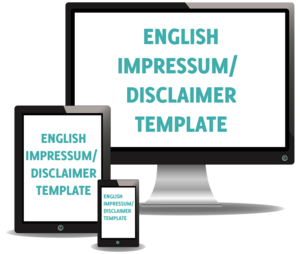How to translate “Impressum” – Free template!
This legal notice is required by German law – but how is it translated correctly?

Is your business based in Germany and you’re struggling with how to translate the heading “Impressum” for the English version of your website? You're not alone. In this article we'll explain all you need to know about an English “Impressum” and offer a free Impressum/Disclaimer template.
Impressum is one of those words that seem to defy translation. There is indeed no exact equivalent in English – “imprint” and “masthead” being the most common mistranslation. However, understanding the difference between its usage in website versus print can make it easier to find a translation that comes close to the spirit of the meaning.
As you can see in this google search query, the term “Imprint” is not used on English websites that are US/UK-based; in contrast, on English websites that are Germany-based, the term "Imprint" is mistakenly used, as seen in this search query.
The heading “Impressum” on websites
According to German law, specific information must be declared on every German website and in every book, newspaper, and magazine, legally identifying the owner. This information is termed “Impressum” and is also legally required e.g. in Austria and Switzerland. In English-speaking countries, however, there is no comparable legislation and therefore no consistent technical term is used on English websites.
On German websites the "Impressum" (which includes the name of the publisher, company address, and more -- see details below) is often directly followed by further legal disclosures, e.g. a disclaimer, information pertaining to copyright policy and data protection, and more.
On a website, the German heading “Impressum” would best be translated as one of the following:
- Company Details or Company Information
- Legal Disclosure or Legal Disclosures
- Legal Notice
- Legal Notifications
If your company is based in Germany or in another country that requires an Impressum (e.g. Switzerland or Austria), I would recommend opting for one of the following:
- Impressum – Legal Disclosure
- Impressum – Legal Notice
- Impressum information
Or you could simply stick to the German term “Impressum” and add a sentence in English explaining that the “Impressum” is required under German law (see Section 5 of the Telemediengesetz/German Telemedia Act).

Free English Impressum and Disclaimer Template
You may copy and adapt/use the following template for your own website free of cost (also for commercial online projects) under the condition that you give appropriate credit to us as the author.
How to give appropriate credit
Please make sure to name Language Boutique as the original author/translator and add a link to our website. Here are some examples that you could use:
- Source language-boutique.com/impressum-template
- English disclaimer text translated by Language Boutique.
- English diclaimer by Language-Boutique.com
Template for your website:
The following information (Impressum) is required under German law.
[Replace the following bullet points with your (company) details.]
- Name of publisher
- Address (simply giving a PO box will not suffice)
- Email address and phone number or contact form
- If applicable: name of company, legal form, authorized represantative
- If listed in an official register (e.g. German Commercial Register): Name and place of register, place, registration number
- If applicable: VAT number or Business Identification Number (“Wirtschafts-Identifikationsnummer”) according to section 139c of the Fiscal Code of Germany
- For regulated professions: statutory job title, responsible chamber, federal state in which the profession was recognized (click here for a complete list of regulated professions in Germany and other countries of the European Union)
- Where applicable: supervisory authority
- For journalistic/editorial content: Responsible person according to German press laws (V.i.S.d.P.)
Online Dispute Resolution website of the EU Commission
In order for consumers and traders to resolve a dispute out-of-court, the European Commission developed the Online Dispute Resolution Website: www.ec.europa.eu/consumers/odr
Legal disclaimer
The contents of these pages were prepared with utmost care. Nonetheless, we cannot assume liability for the timeless accuracy and completeness of the information.
Our website contains links to external websites. As the contents of these third-party websites are beyond our control, we cannot accept liability for them. Responsibility for the contents of the linked pages is always held by the provider or operator of the pages.
Data protection
In general, when visiting the website of [INSERT YOUR (COMPANY) NAME HERE], no personal data are saved. However, these data can be given on a voluntary basis. No data will be passed on to third parties without your consent. We point out that in regard to unsecured data transmission in the internet (e.g. via email), security cannot be guaranteed. Such data could possibIy be accessed by third parties.
Google Analytics [where applicable*]
This website uses Google Analytics, a web analytics service provided by Google, Inc. (»Google«). Google Analytics uses cookies, which are text files placed on your computer, to help the website analyze how users use the site. The information generated by the cookie about your use of the website (including your IP address) will be transmitted to and stored by Google on servers in the United States. In case of activation of the IP anonymization, Google will truncate/anonymize the last octet of the IP address for Member States of the European Union as well as for other parties to the Agreement on the European Economic Area. Only in exceptional cases, the full IP address is sent to and shortened by Google servers in the USA. On behalf of the website provider Google will use this information for the purpose of evaluating your use of the website, compiling reports on website activity for website operators and providing other services relating to website activity and internet usage to the website provider. Google will not associate your IP address with any other data held by Google. By using this website, you consent to the processing of data about you by Google in the manner and for the purposes set out above.
How to prevent being tracked by Google Analytics
- You may refuse the use of cookies by selecting the appropriate settings on your browser. However, please note that if you do this, you may not be able to use the full functionality of this website.
- Furthermore you can prevent Google’s collection and use of data (cookies and IP address) by downloading and installing the browser plug-in available under https://tools.google.com/dlpage/gaoptout?hl=en.
[Source Language-Boutique.com/Sample-Impressum]
Terms of use/Legal notice
We explicitly point out that we are not capable, nor authorized to give legal advice of any sort. The information that we have provided here can by no means replace qualified legal advice. Therefore any use of the provided information is at the user's own risk. Other requirements may apply to your website/services/legal form than contained in the above sample text. In case of any uncertainty about the requirements for your individual legal notice or disclaimer we advise you to consult a lawyer. However, feel free to get in touch with us in case you need any help with proofreading or translating texts for your website.
*The Google Analytics boilerplate that is cited above used to be provided by Google in this wording until a while ago (we just made very slight adjustments). Google does not offer this text module any longer. However, assuming that the information regarding data privacy and electronic data processing is still accurate, we ourselves still use this same text. If you share our estimation, feel free to also use this text module at your own risk.
The heading “Impressum” in printed materials
If it is a print publication, then a decision must be made as to whether the publication should more closely resemble German or English publishing conventions. Typically, in English language magazines and brochures, the kind of information included in the “Impressum” would be listed without any heading at all. You would simply find it unobtrusively running down the side of a page.
Furthermore, since the information is not primarily intended to fulfill a legal obligation, and thus not confined to specific disclosure, even if you choose to give it a heading it would be less of a legal statement and more a matter of listing credits, e.g., the creator of the design or layout might be mentioned along with the publisher. So for this purpose, the following options might be appropriate:
- Publishing Details
- Credit Notes
Next time you are faced with translating “Impressum,” first consider whether or not you even need to include a translation of the word. If you do, make sure it is appropriate to the context.
Don’t let all the mistranslations you find online fool you: Don’t use “Imprint” or “Masthead”!
For more information, check out this Wikipedia entry: en.wikipedia.org/wiki/Impressum
You need help with proofreading or translating a German website into English?
Comment by sean |
Thanks for the info.
FYI:
"Gemutlichkein" is spelled Gemütlichkeit.
So like Baloo the bear says in the German dub of The Jungkle Book: "Probiers mal mit Gemütlichkeit!"
Comment by Richard Robertson |
Actually the term "Disclosures" is a complete and accurate translation in English; there is no ambiguity in the usage. "Company Information" would be logical for a site owned by a business. "Disclaimer" would be very inaccurate though as it implies a warning or cautionary message (unless you are including that in your impressum) but if you are trying to do that combined with the mandatory disclosures as well then the correct term would be "Notifications" (which actually work in all cases). English has multiple words that mean the same thing denotatively but differing in connotation. You have to understand the word related to the specific intent in order to best translate. German does have some difficult words to translate but this isn't one of them. "Gemutlichkein", for example, would be unless you did a literal translation of the root and suffixes "good-moodliness". I've actually lived in Germany and formally studied the language.
And, yes, I just noticed my web site certificate expired. It means I have to temporarily disable an .htaccess file for Let's Encrypt to function long enough to re-certify. :(
